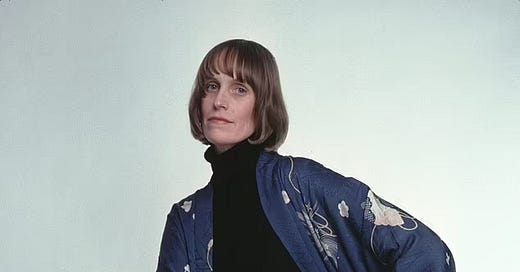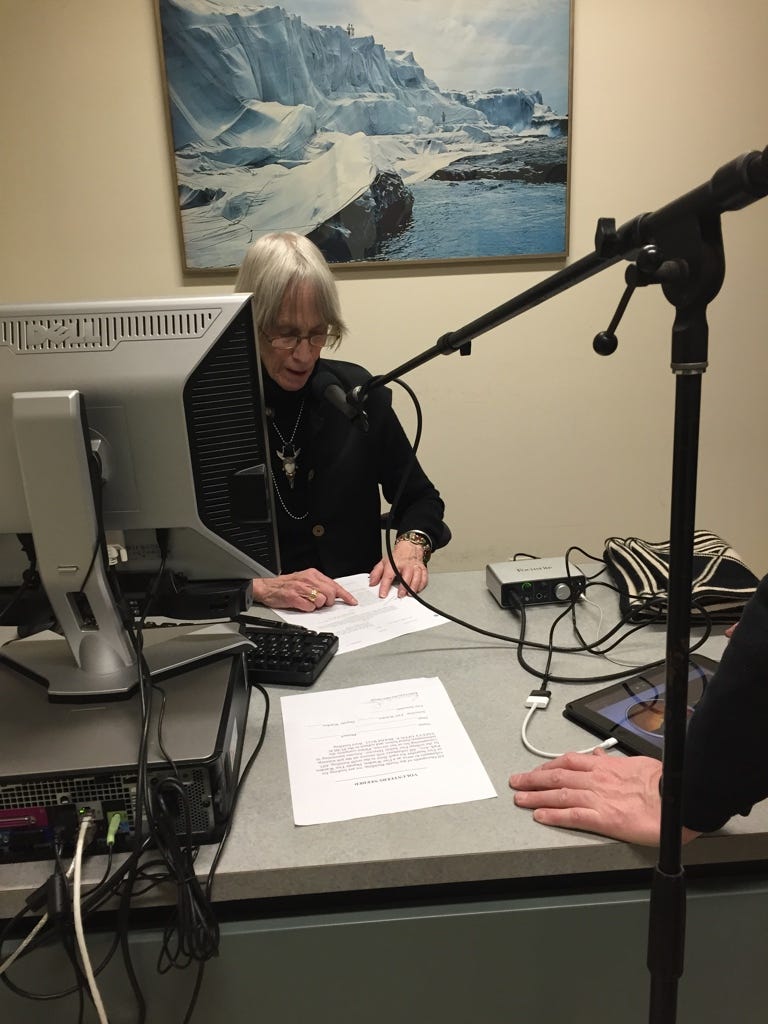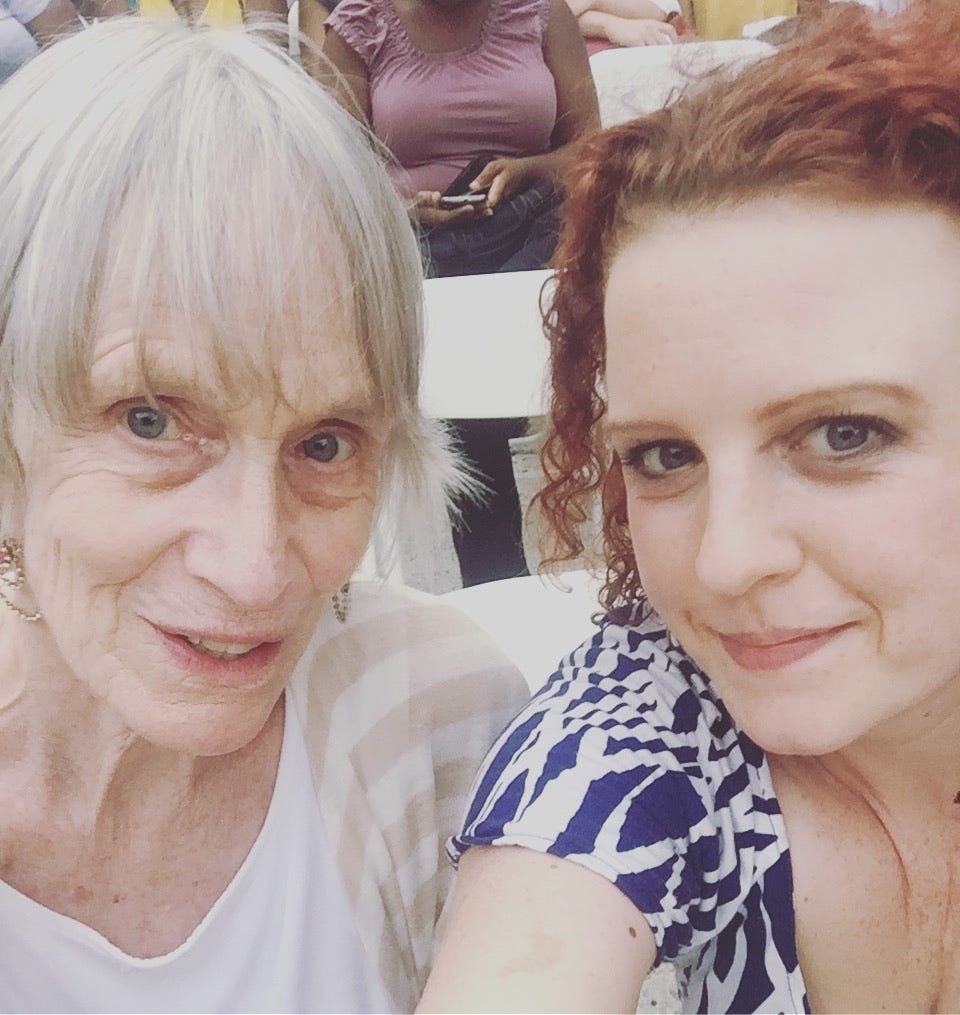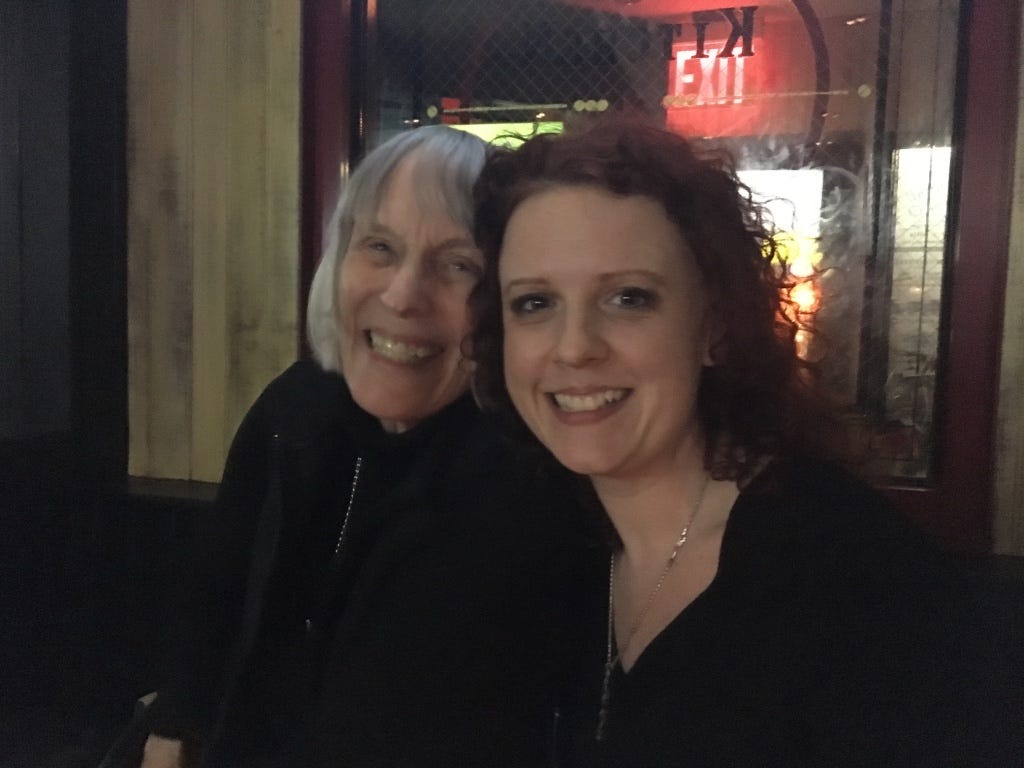This post is a bit of a departure today, but I just lost one of the most important people in my life. On August 29th, I got the heartbreaking news that my mentor and friend - the incredible playwright Tina Howe - had passed away. Her death has unmoored me in a way that I couldn’t anticipate, even though I knew that the day would come. I will try to talk about how much she meant to me, but I can’t possibly do it justice. But I’ll give it a go.
I was a big fan of Tina’s work from my undergrad days, when I grew increasingly frustrated with the amount of male playwrights that were being taught. I was tired of Chekhov and Shakespeare and Guare and Albee. I went to the Strand and taught myself some new names - Vogel, Henley, Wasserstein, Howe. Tina’s work stood out to me especially. Her female characters were so rich and vivid, and while her absurdist roots are much different from how I write, I was taken in by the worlds she created. She also loved a coastal setting, as do I. The first play I read of hers was Coastal Disturbances, and I was rapt. I read everything she wrote. When the opportunity to study with her a decade later presented itself, I jumped on it.
When I interviewed for the MFA Playwriting program at Hunter College in 2013 with Tina and Mark Bly (who was co-head of the department at the time), Tina’s effusiveness disarmed me immediately. I told her I was a big fan of her work, to which she replied “NO I AM YOUR FAN!”. Normally when people say things like that - especially in this business - it brings out the cynical side of me. In this case, I believed her. What struck me was that what she took away from the play I submitted to the program - Paper Cranes - was a clear understanding of me as a writer that I had never felt before. I was offered a slot in the program at the end of the interview, which shocked me so much that I actually said I had to go home and think about it. After years of rejection, it was the first strong yes I’d never received. A seat at the table.
When I emailed my acceptance the next morning - as if there were ever a question - Tina’s email back to me was:
“HOT DIGGITY DAWG!
The paper cranes have lifted off the ground and are doing happy loop
the loops over Hunter College!
We're going to have an airborne time together, I can tell!”
And we did. For two glorious years, I was her student. For ten glorious years, I was her friend.
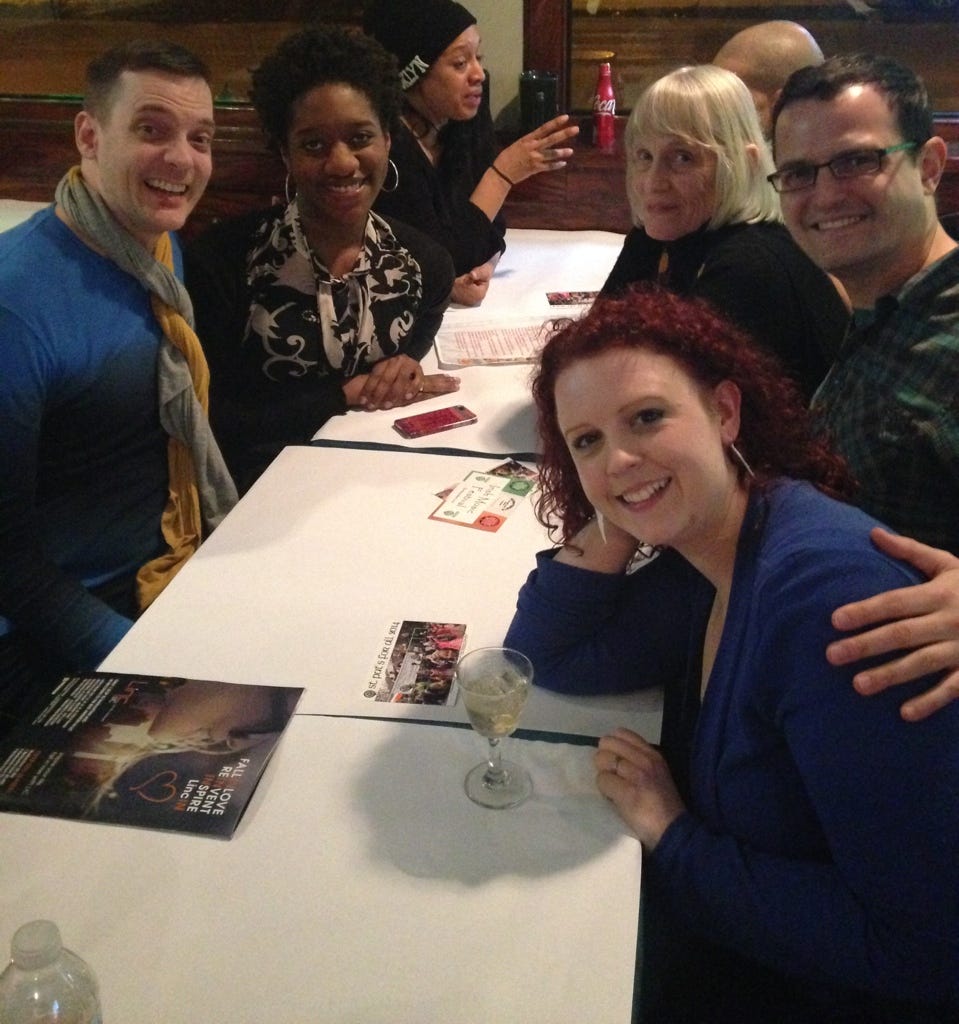
During my first year of school, I experienced a lot of personal upheaval. At the beginning of my second semester, we started to write our thesis plays in her class. One snowy afternoon, I met up with Tina at the Utopia Diner on the Upper West Side. We were just there to talk about my play, but she could tell that something was bothering me. I still didn’t know her that well, so I was a bit guarded at first, but she always got me to drop my armor. I felt safe with her, so I confided in her that I had recently become estranged from my mother, and I was deep in grief. She was tender and understanding. She shared things with me about her own mother, and we talked a lot about the Mother Wound, and how that informs the work of female writers. She told me she admired my strength, and that she was there to support me. I do not know how I would have gotten through that time without her.
I wrote my thesis play Prepared in 2014, under her mentorship. It was a play about a teenaged boy and his isolationist prepper mother. I wrote it as a response to the Sandy Hook shooting in Connecticut, which happened 20 minutes from where I grew up. I wasn’t interested in writing about the tragedy, or its aftermath - I was more interested in Adam Lanza, the young male shooter who took the lives of 26 people, most of them 5 or 6 years old. I wrote the play as an attempt to investigate the link between paranoia and isolation, right wing rhetoric, and the ever-increasing spate of school shootings in the United States. She loved the idea from the jump, and to this day it is the most spare and unflinching play I have ever written. Anytime I felt I was going too far, or the play was getting too brutal, she encouraged me to go deeper. When the play went on to win the Goldberg Award at Hunter, she was so proud. I have nearly 600 emails in my Gmail that are from Tina, but the one she wrote me after I won the award is one I will always treasure. This is a snippet:
…It’s your bravery and willingness to stare horror in the face, and then give it back to us in an altered almost bearable shape, that leaves us so enthralled... and not quite sure.
And then there’s your tenderness and generosity along the way…
Ending the play with [redacted spoiler in case it gets done again]…
WHO WRITES THAT SCENE??
YOU do!
With a breaking, but still brimming heart.
So once again, hearty congratulations for writing the play and then winning the prize.
This is just the beginning.
JUST
THE
BEGINNING!
xo, Tina
About a year after I graduated, I met up with Tina on the Upper West Side. We took in a free dance performance outside at Lincoln Center and then sat down for an irresponsible amount of frozen margaritas. I once again had lost out on opportunities to other writers, peers whose names I kept seeing pop up over and over and over. I felt defeated and bitter. I worked very hard not to let jealousy get the best of me, but that day it had. It’s not that I felt they didn’t deserve it, it's more that I wondered what I was doing wrong. What ingredients had to go into the special sauce. I vented my frustrations that I hadn’t gotten further, and that I was struggling with how to proceed. Tina said something to the effect of that she had seen a lot of successful plays that were good on the surface, and easy to produce, but only scratched the surface of the topics I was interested in. She told me I wanted to “tear up the floorboards and put my hands in the rot underneath”, and that perhaps people simply weren’t ready to receive what I was doing yet.
And then she said something I will never forget, in her effusive Tina Way, grabbing both of my hands and looking straight into my eyes: “Of course I know it's frustrating to see others get the big prize. BUT YOU!!! YOU my dear - you are hunting bigger game.”
She was right. She was always right. My most important work was still ahead of me, and I never forgot what she told me. I could not let my desire for success take over who I was as an artist. She helped me find my voice. She taught me that it had value. In this brutal industry, sometimes you need one person to believe in you. That person for me was Tina. She taught me about who I was as a person and an artist, with the discipline of a serious professor but the whimsy and nurturing of a kindergarten art teacher. She was also there for me as a friend. Any time I needed advice, I knew I could pick up the phone and call her, convince her to meet me out for drinks, or be invited to her beautiful apartment on the Upper West Side with french doors, a view of the Hudson, and a fresh made Bloody Mary delivered to me by her husband, Norman.
What Tina gave to her students and mentees is a rare thing: A nearly egoless generosity. She showed up for us - from readings in leaky basements to Off-Broadway productions - she made every performance that she could, gifts and kind words in tow. When I heard of her passing, nearly every single one of her students had a lengthy anecdote or two about their special relationship with her. She went out of her way to make us all feel important, valued, and respected. Her thoughtful gift giving is legendary and spoken of by nearly anyone who worked with her in any capacity: as I type this, I am looking at a desk full of tchotchkes from her. She is all over my apartment. One of my most treasured Tina gifts is a necklace with a pendant of a humpback whale. I still wear it often.
COVID, of course, changed everything. I was terrified of getting her sick, and up until we were all vaccinated, I didn’t see her in person. We still talked regularly on the phone and exchanged emails, and were able to see each other in person a couple of times in 2021. Things went downhill after that - both with the death of her beloved Norman and her memory issues towards the end of her life - but I was able to attend the reading of her beautiful play Where Women Go at 59E59 back in April. It was a joyous reunion of Hunter writers and actors past and present, and even though Tina’s memory was failing her, she was thrilled to see her own work up on that stage and I know she felt our love. It was the last time I would see her.
I’ve never been religious. Tina wasn’t religious either. She believed that creating art was a way to be magic here on earth. The way we can be divine. Her sense of wonder and amazement about the world - even the most mundane things - felt more potent to me than any deity could offer. I don’t know if I believe in an afterlife. I suppose the thing about aging is that as death touches your life more and more, you start wanting to believe an afterlife exists. Like most things in this world, it seems a bit too good to be true. Despite that, I cannot help but wish that right now she’s having a Bloody Mary with her beloved Norman. As I look around and still see her gifts everywhere - the tchotchkes, the journal inscriptions, the posters of plays I never would have written if not for her - she is certainly still here with me in some form. Maybe that’s all the afterlife really is - that you survive in the memories of others. Lord knows she made enough beautiful memories with all of us to grant her an eternity.
I tried to find a good quote that would somehow sum it up about Tina, but came up short, until I remembered one. It’s still one of my favorite closing lines in a book, and all credit goes to the immortal E.B. White:
It is not often that someone comes along who is a true friend and a good writer.
Tina was both.

